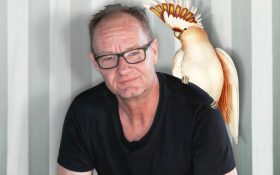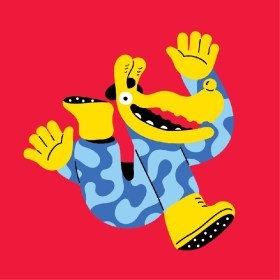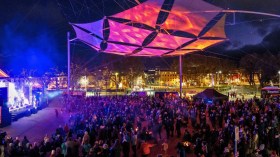The Dictionary of Lost Words by South Australian author Pip Williams became a surprise international bestseller when it was published mid-pandemic. It was a debut novel with a very literary theme and a seemingly niche appeal. But the book-reading public embraced this story about words and the power of language and it quickly became a book club favourite everywhere.
It has now been adapted for the stage by another South Australian, accomplished playwright Verity Laughton, and brought to life in a joint production between State Theatre SA and the Sydney Theatre Company. Its world premiere season is playing in Adelaide with a Sydney season to follow.
The show opens to a marvellous set with a grand curved shelving unit filling the entire stage. This is variously a bookshelf, the pigeonholes for filing away words and letterboxes for correspondence. There are also hidden doorways and steps to an upper level. Projections are shown above this superb set to enhance and illustrate key moments in the script.
The set really becomes a central character in the play and full credit to designer Jonathon Oxlade for a brilliant concept. The design is also enhanced by an evocative soundtrack by composer and sound designer Max Lyandvert.
As we enter the world of Lost Words we are in “the scrippy”, a glorified garden shed at Sunnyside, the home of Sir James Murray on Banbury Road in Oxford, where the first edition of the Oxford English Dictionary is being compiled. This much is true, and a little blue plaque in the street confirms that indeed it did happen here.
The diligent lexicographers devote many years to the project – indeed, a lifetime for Sir James who dies before it is finished.
The fictional character little Esme Nicoll plays and hides under the table as her father and his colleagues work assiduously on their overwhelming task. As words are abandoned, Esme saves them to eventually create her own “dictionary” of these lost words.
South Australian actor Tilda Cobham-Hervey is well cast as Esme and effectively grows her character in both age and wisdom. Beginning as a playful four-year-old and transitioning through adolescence to adulthood is quite a task for an actor. Cobham-Hervey handles it skilfully, and is charming and convincing throughout, even as her character grapples with the challenges of the time and her personal and political situation.
Without a mother, young Esme forms a close bond with the family maid Lizzie, played here with real feeling by Rachel Burke. Their shared scenes are warm and funny, and very real. Esme’s godmother Ditte is also a key character in her development. Ksenja Logos is very appealing as Ditte and quite delightful in her other roles, especially as Mabel, the old woman in the market. Most of the actors take on multiple roles and, while this generally works, it does imbue some scenes with just a touch of pantomime.
All of the elements in this production are excellent, but somehow the final result is a little less than the sum of its parts. There was a stiffness on opening night that undermined the intimacy of the drama. It felt as if the play was trying to do too much and say too much. A little more lightness of touch may allow it to feel more fully formed, just as the white space on a sheet of paper allows the graphic design to shine.
Read: Theatre review: My Sister Jill, Southbank Theatre
This play is all about words – about a love of words and about the power of language. It’s about the words that weren’t considered acceptable – the women’s words or working class words – as much as those that were deemed worthy of inclusion in this great dictionary. It’s also about the time and place with the campaign for women’s rights and the Great War as a backdrop. And, yes, it’s fiction but much of it is true and valuable and still meaningful today. There’s much to love and to celebrate in The Dictionary of Lost Words.
The Dictionary of Lost Words, State Theatre of SA
Dunstan Playhouse, Adelaide Festival Centre
Writer: Pip Williams
Adapting Playwright: Verity Laughton
Director: Jessica Arthur
Set Designer: Jonathan Oxlade
Costume Designer: Ailsa Patterson
Lighting Designer: Trent Suidgeest
Composer: Max Lyandvert
Assistant Director: Shannon Rush
Accent Coach: Jennifer Innes
AV System Designer: Lachlan Turner
Cast: Brett Archer, Rachel Burke, Tilda Cobham-Hervey, Raj Labade, Ksenja Logos, Angela Mahlatjie, Chris Pitman, Anthony Yangoyan
The Dictionary of Lost Words will be performed in Adelaide to 14 October 2023 before touring to Sydney Opera House from 16 October 2023.





